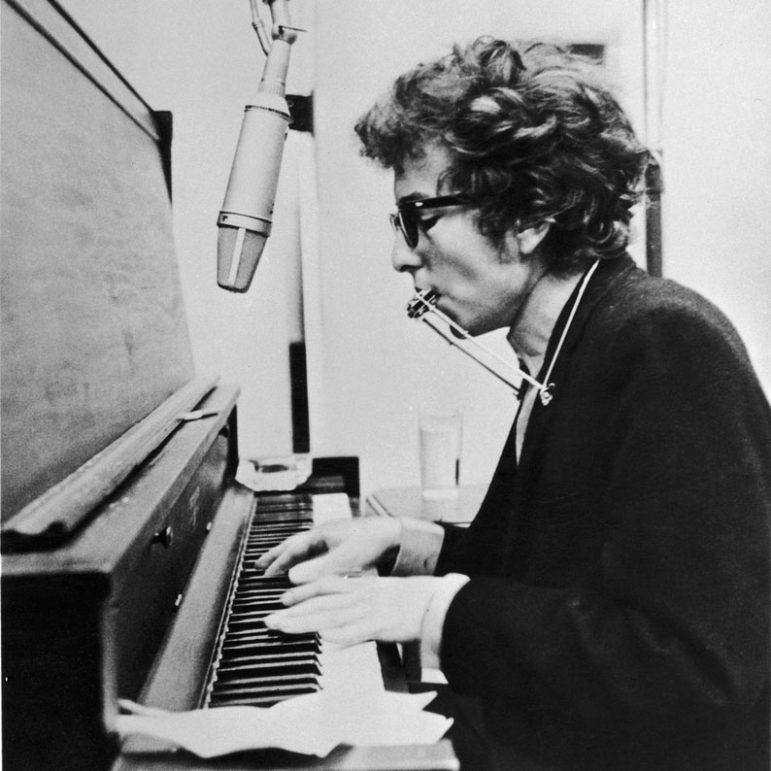
October 13, 2016; New York Times
Before we launch into this story, here is a video of Dylan and Joan Baez at the 1963 March on Washington to play in the background. It is a reminder for those of us who lived through those times and a dive into history for others.
His name has long been floated as worthy of consideration for the honor, based on the literary merits of his song lyrics. Still, when the news broke yesterday in Stockholm that Bob Dylan had been awarded the 2016 Nobel Prize in Literature, it seemed to take many by surprise. And while there were some detractors, most of those who weighed in on the announcement Thursday were delighted. They seemed to agree with the Swedish Academy that the influential musician deserved this high honor for “having created new poetic expressions within the great American song tradition.” Or, as the New York Times described Dylan’s literary legacy, “dazzling lyrics and an oblique songwriting style that made him a source of fascination for artists and critics” with “one of the most densely analyzed bodies of work in the history of pop music.”
Dylan, 75, rarely gives interviews and offered no comment on the award when he performed Thursday evening in Las Vegas, before heading back to Indio, California, to take the stage Friday evening during the second weekend of the Desert Trip music festival. (Last week, he played a 90-minute set there without ever once speaking to the audience, except through his songs.)
Dylan is the first American to receive the Nobel Prize in Literature since Toni Morrison in 1993. As noted by Rolling Stone, he now joins an elite group of American literary luminaries that includes William Faulkner, Ernest Hemingway and John Steinbeck. The Nobel Literature prize is based on an author’s full body of work, not one specific accomplishment, as with some of the other Nobel awards. An article in the Los Angeles Times noted that someone who was in the room in Stockholm when Dylan was announced as the 2016 winner called the decision “radical.” In response, Sara Danils, permanent secretary of the 18-member Swedish Academy, compared Dylan to the Greek lyric poet Sappho and suggested the questioner might start with Dylan’s 1966 Blonde on Blonde album to understand the Academy’s decision.
Sign up for our free newsletters
Subscribe to NPQ's newsletters to have our top stories delivered directly to your inbox.
By signing up, you agree to our privacy policy and terms of use, and to receive messages from NPQ and our partners.
The New York Times article cited a 2010 piece in the New York Review of Books written by Giles Harvey that described Dylan’s songwriting this way:
Dylan grew increasingly frustrated with what he came to regard as the pious sloganeering and doctrinaire leftist politics of the folk milieu. [He] began writing a kind of visionary nonsense verse, in which the rough, ribald, lawless America of the country’s traditional folk music collided with a surreal ensemble of characters from history, literature, legend, the Bible, and many other places besides.
Within hours of the Nobel announcement on Thursday, Yahoo News had collected statements and tweets from around the globe, including a few snarky swipes at the Nobel committee (like “Reading books is hard”), and this tribute to Dylan from internationally regarded author Salman Rushdie:
We live in a time of great lyricist-songwriters—Leonard Cohen, Paul Simon, Joni Mitchell, Tom Waits—but Dylan towers over everyone. His words have been an inspiration to me ever since I first heard a Dylan album at school, and I am delighted by his Nobel win. The frontiers of literature keep widening, and it’s exciting that the Nobel Prize recognizes that. I intend to spend the day playing “Mr. Tambourine Man,” “Love Minus Zero/No Limit,” “Like a Rolling Stone,” “Idiot Wind,” “Jokerman,” “Tangled Up In Blue,” and “A Hard Rain’s a-Gonna Fall.”
The Yahoo News report also noted that, “Many music fans already quote Dylan as if he were Shakespeare, and judges work Dylan quotes into their legal opinions all the time, such as ‘The times they are a-changing’ and ‘You don’t need a weatherman to know which way the wind blows.’”
Dylan has previously received Grammy, Academy, and Golden Globe Awards. He was inducted into the Rock & Roll Hall of Fame in 1988. In 2012, he received the Presidential Medal of Freedom from President Obama. His “Never-Ending Tour,” which began in 1988, may need to make a detour through Stockholm on December 10th to collect this most prestigious of awards (which includes a monetary prize of about $900,000).—Eileen Cunniffe













